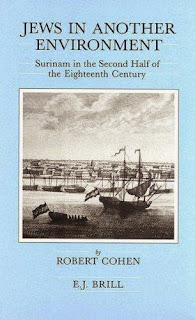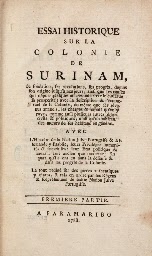David de Ishac Cohen Nassy (1747-1806) schreef Lettre politico-theologico-morale sur les Juifs
Het ziet er naar uit dat zowel de titel als het denkraam geïnspireerd is op Spinoza’s Tractatus theologico-politicus [zie onder].
 David Nassy was
een toonaangevende figuur in het culturele leven van Suriname in de tweede
helft van de 18de eeuw. En hij werd de eerste jood die tot burger van de VS van
Amerika werd genaturaliseerd.
David Nassy was
een toonaangevende figuur in het culturele leven van Suriname in de tweede
helft van de 18de eeuw. En hij werd de eerste jood die tot burger van de VS van
Amerika werd genaturaliseerd.
David Nassy werd geboren in Suriname, door zijn vader opgeleid in het notariaat en vervulde de secretariële functie van adjutante-gabay bij de joods-Sefardische gemeenschap Beracha ve Shalom (Zegen en Vrede) te Jodensavanne. Hij was weinig succesvol als koffieplanter, volgde zijn vader op als jurator (gezworene) van de Joodse gemeenschap, maar vluchtte in 1776 voor zijn schuldeisers naar Jodensavanne.
Nassy schreef het eerste prozastuk in de Letterkundige
Uitspanningen van het genootschap De Surinaamsche  Lettervrinden. In 1788
voltooide hij het belangrijke geschiedwerk Essai historique sur la colonie de
Surinam (1789) waarvan S.H. Brandon, M.P. de Leon, S.J.V. de la Parra en J. de
la Parra de mede-auteurs waren en waarvan in 1791 de Nederlandse vertaling
verscheen als Geschiedenis der kolonie van Surinam.
Lettervrinden. In 1788
voltooide hij het belangrijke geschiedwerk Essai historique sur la colonie de
Surinam (1789) waarvan S.H. Brandon, M.P. de Leon, S.J.V. de la Parra en J. de
la Parra de mede-auteurs waren en waarvan in 1791 de Nederlandse vertaling
verscheen als Geschiedenis der kolonie van Surinam.
In 1792 vertrok Nassy naar Noord-Amerika (Philadelphia), waar hij als medicus werkzaam was. In Philadelphia liet hij in 1793 een boek verschijnen over epidemische ziekten, waarin hij de bestrijding van de gele koorts beschreef, waarvan hij als de ontdekker geldt. Hij werd het eerste joodse lid van de American Philosophical Society. Hij keerde in 1795 terug naar Suriname en werd tot Doctor benoemd. Hij bleef als publicist actief en schreef onder meer de tegen een Dordts anti-joods pamflet gerichte Lettre politico-theologico-morale sur les Juifs. (Paramaribo, ca. 1798).
Hij zag
anti-semitisme als vooroordeel
The title is suggestive, of course, of Spinoza's work, whose importance for the
enlightenment world had been spelled out by Mendelssohn. Nassy explored the
significance of the kind of freedom that existed in America compared with the
Revolutionary anarchy in France. He foresaw the possibilities America held out
to the persecuted groups in Europe, and the cultural flowering that could occur
in the United States as compared with Europe. In his analysis of anti-Semitism,
he saw that its evil effects would disappear in America because of the legal
equality of American citizens. "Ail men, then, must be equal in their
rights, equal in their privileges: their birth, cults, wealth, and ranks do not
determine at all their inequality."
The denial of this equality represents a disease (called a "prejudice" by Nassy) affecting Europe but from which America was immune because "of that wise and enlightened philosophy which makes no distinction among men, except that which is demanded by virtue, useful talents and good mores.” Nassy saw Europe as becoming infected with the new disease or prejudice of secular racism while the United States was safe because it had eliminated religious distinctions in its laws. There is no indication of where Nassy stood on the slavery question. Others who could see the menace of secular racism, and view America as a bastion against it, were some of the millenarian leaders of the American and French revolutions who saw this more thoroughly. They objected to the blacks being condemned because of their physical features and the Jews because of their mental or spiritual ones and claimed that these developments were hindering preparations for the millennium. *)
_________________
*) De citaten zijn uit: Jose Faur, "David Nassy: On Prejudice and Related Matters," in Neveh Ya'akov: Jubilee Volume Presented to Dr. Jaap Meyer, ed. Lea Dasberg and Jonathan N. Cohen, (Assen, 1981), 87-116.
 *) Tekst uit: Rousseau, G.S., editor, The Languges of Psyche: Mind and Body in
Enlightenment Thought. Berkeley: University of California
Press, c1990. [Cf.]
*) Tekst uit: Rousseau, G.S., editor, The Languges of Psyche: Mind and Body in
Enlightenment Thought. Berkeley: University of California
Press, c1990. [Cf.]
José Faur, Sepharadi Thought in the Presence of the European Enlightenment [PDF]
Robert Cohen, Jews in Another Environment. E.J. Brill, 1991 - books,google
Ineke Phaf-Rheinberger, The air of Liberty': Narratives of the South Atlantic Past. 'Rodopi, 2008 - books,google
http://nl.wikipedia.org/wiki/David_Nassy

